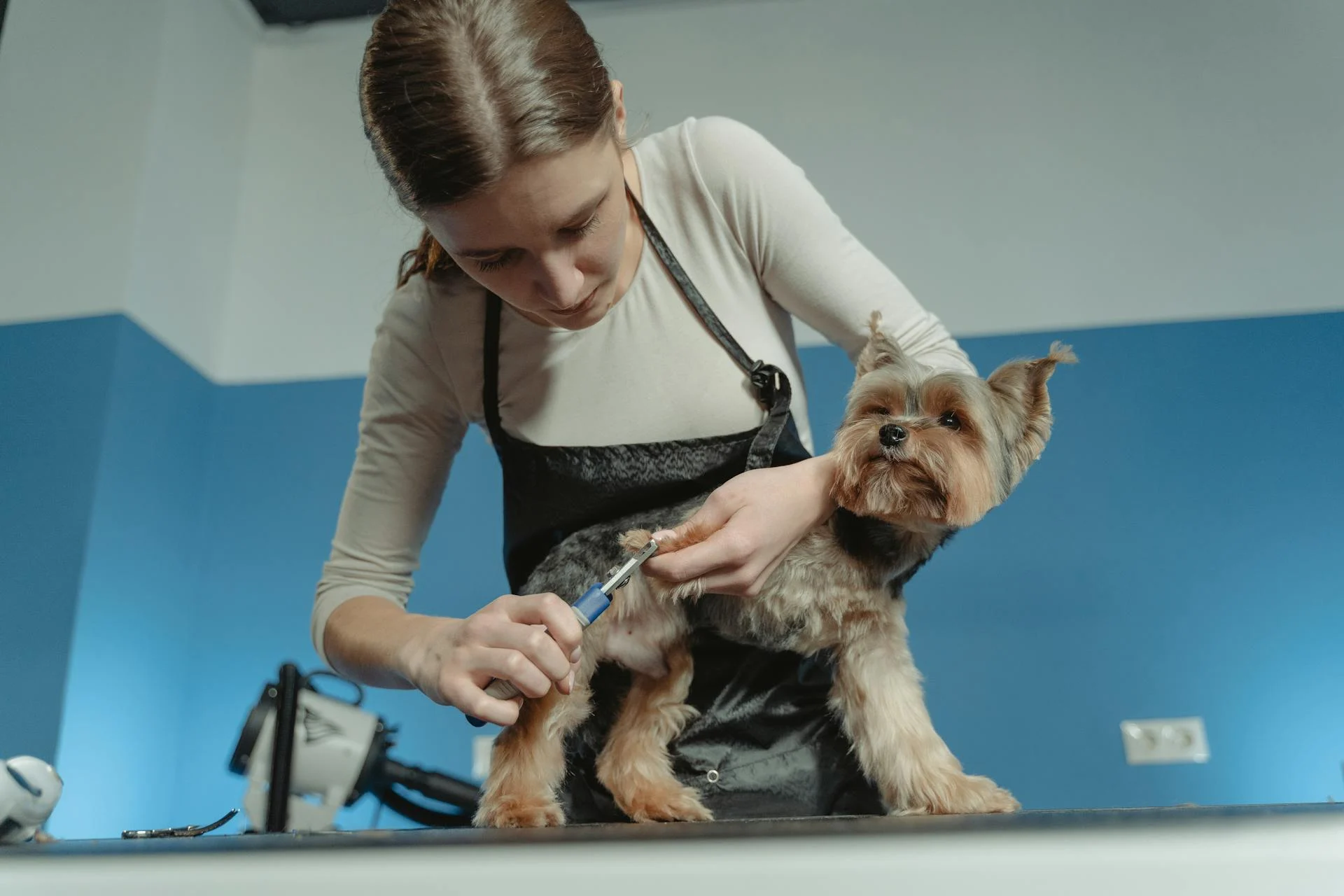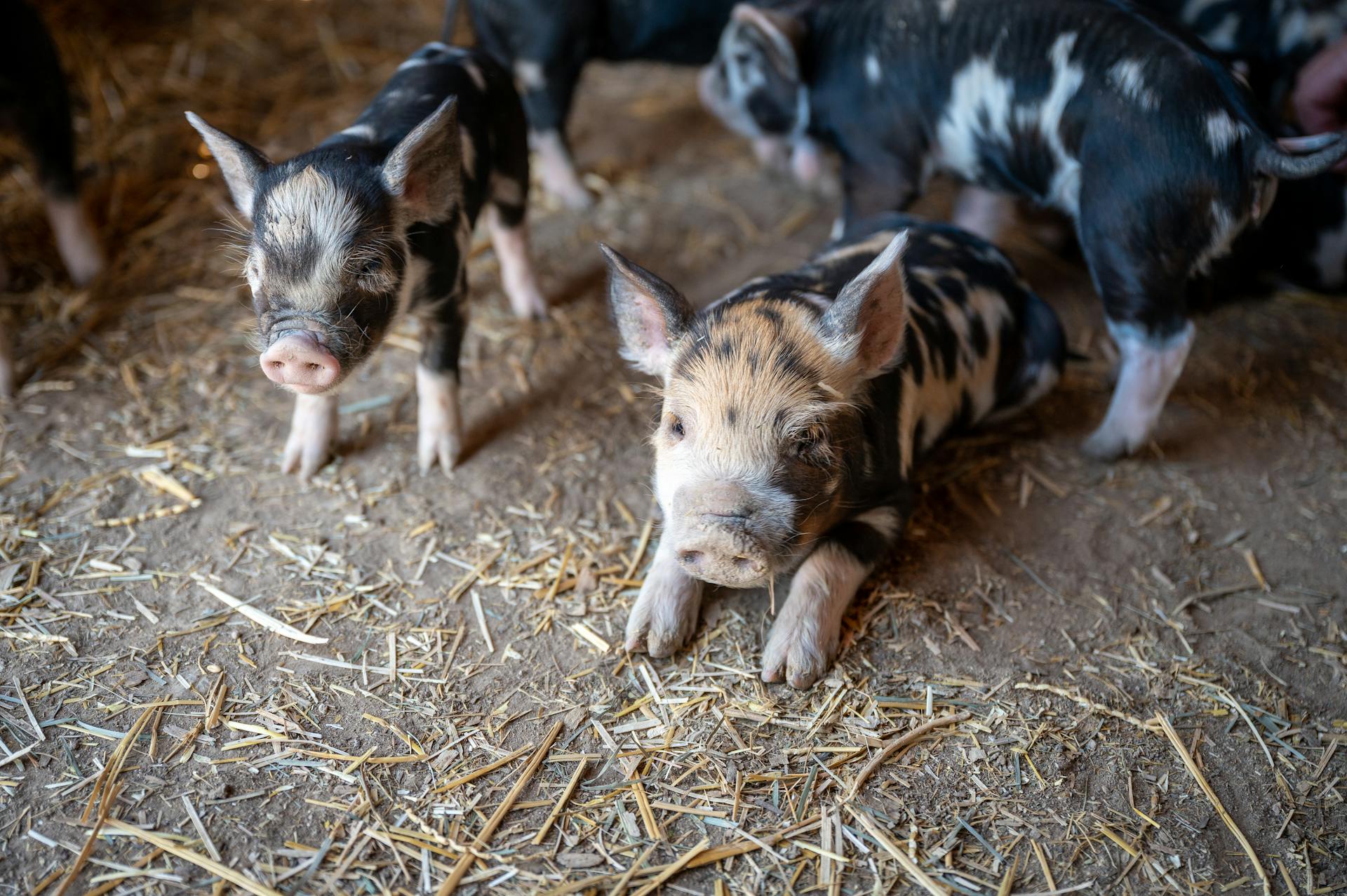
The Weimardoodle is a cross between a Weimaraner and a Poodle, making it a unique and lovable companion for many families.
This breed is generally medium to large in size, with males weighing between 70-90 pounds and standing 23-27 inches tall at the shoulder.
With their short, smooth coats, Weimardoodles require regular grooming to prevent matting and tangling.
Their intelligence and trainability make them a great choice for active families who enjoy outdoor activities and mental stimulation.
Physical Characteristics
Weimardoodles are medium to large-sized dogs. Their height can vary between 20-27 inches (50 to 68 cm).
A Weimardoodle's weight can vary between 45-70 lb (20 to 31 kg).
Mini Weimardoodles are generally smaller, weighing less than 18kg.
On average, a fully grown male Weimardoodle is around 24.5 inches (62 cm) tall.
Temperament and Personality
Weimardoodles are affectionate, happy, loyal, and active dogs that thrive on attention. They love to play with their family and are alert about things going on around them.
They make excellent watchdogs, always happy to alert you to anyone at your door. Their intelligence and loyalty make them a great companion for families.
Weimardoodles are incredibly intelligent and will excel in all sorts of training, just like their purebred poodle parent. They're gentle dogs that are great with children and other pets – as long as they're well socialized from an early age.
Weimardoodles have a lot of energy that needs to be used up by puzzle games, exercise, time spent with you, and doggie sports. They will become mischievous if their brains aren't engaged.
They respond well to lots of positive reinforcement and praise from you, especially if they inherit more poodle personality. With early socialization and training, you can avoid any stubborn tendencies.
Weimardoodles can suffer from separation anxiety if left alone for long periods of time, so they need owners who have enough time for them. This makes them a great fit for families with multiple people or those who work from home.
Expand your knowledge: Great Doodle Dog
Health and Grooming
Weimardoodles are generally healthy hybrid dogs, but they can inherit some health issues from their parent breeds. They tend to have fewer health issues compared to their parent breeds, but it's still essential to be aware of the potential conditions they may develop.
Some common health issues in Weimardoodles include hip dysplasia, Von Willebrand's disease, eye and skin issues, and bloating. Regular checkups with the vet can help catch these issues early on and prevent them from escalating.
Weimardoodles are low-shedding dogs, making them a good choice for owners with allergies to pet dander. However, their coat type can affect their grooming needs. If they inherit the curly coat of their Poodle parent, they'll need brushing several times a week to avoid matting and tangles, and trimming several times a year by a professional groomer.
Here are some common health issues and potential grooming needs to be aware of:
- Patella Luxation: kneecap out of place
- Hip Dysplasia: thigh bone doesn't fit correctly into the hip joint
- Von Willebrand's Disease: bleeding disorder
- Progressive Retinal Atrophy: degenerative eye disease
- Bloat: stomach fills with gas, food, or liquid and twists
Regular grooming and ear cleaning can also help prevent infections and keep your Weimardoodle healthy and happy.
Grooming
Weimardoodles are low-shedding dogs, making them a great choice for owners with allergies to pet dander.
Their coat can be curly, wavy, or even shaggy, depending on the parent they inherit from. A curly coat will require brushing several times a week to avoid matting and tangles.
You should clean your Weimardoodle's ears on a weekly basis with a cotton ball to prevent infection. This is especially important if your dog has floppy ears.
Their teeth should be brushed three to four times a week to eliminate bacteria and tartar buildup. Brushing their teeth regularly will keep their breath fresh and their teeth healthy.
Weimardoodles don't need to be bathed frequently, but they should be bathed if they're dirty or have gone for a swim. Over-bathing can strip their coat of its natural oils.
Their nails should be clipped once or twice a month when they get too long. If you're not comfortable cutting their nails, this can be done by a professional groomer.
A good grooming schedule will provide your dog with a haircut about once every 3 months. This will keep their coat looking its best and prevent matting and tangling.
Curious to learn more? Check out: Gordon Doodle Dog
Health
Weimardoodles are generally healthy hybrid dogs, but they can suffer from conditions such as hip dysplasia, Von Willebrand's disease, eye and skin issues, and bloating.
Regular checkups with the vet are crucial to catch any potential health issues early on.
Weimardoodles can inherit some of the common diseases associated with their parent breeds, such as hip dysplasia, patella luxation, and progressive retinal atrophy.
These conditions can be very painful and even life-threatening if not treated promptly.
Some of the most common possible diseases that Weimardoodles may suffer from include:
- Patella Luxation: a condition in which the kneecap is out of place
- Hip Dysplasia: a common condition in which the thigh bone doesn't fit correctly into the hip joint
- Von Willebrand's Disease: a bleeding disorder in which the pup doesn't have enough of a specific protein for the blood to clot
- Progressive Retinal Atrophy: a degenerative eye disease that can eventually lead to blindness
- Bloat: a stomach condition that can be fatal if not operated on quickly
It's essential to get your Weimardoodle vet-checked regularly to catch any potential health issues before they escalate.
Dog Itchy Rash on Belly
If your furry friend is scratching away at their belly, it could be due to a dog itchy rash caused by food or environmental allergies. Allergies can be a common culprit behind itchy rashes on dogs.
Parasites, such as fleas or ticks, can also cause intense itching and discomfort on your dog's belly. These pesky critters can be easily treated with medication or topical creams.
Identifying the cause of the itchy rash is crucial to providing effective treatment and preventing future occurrences.
Check this out: Brown Doodle Dog
Dog Allergies: Causes, Symptoms & Treatment
Dog allergies are a common struggle for many dogs and Poodle mix breeds are no exception. They can inherit skin issues and allergies from their Poodle parent.
Weimardoodles, in particular, are prone to skin issues and allergies due to their Poodle heritage. This can cause them to develop itchy rashes on their belly.
Food or environmental allergies can cause dog itchy rash on the belly area, as well as parasites. So, if you suspect your Weimardoodle has an allergy, it's essential to consult with a veterinarian to determine the underlying cause.
Some common symptoms of dog allergies include excessive scratching, chewing, and licking, which can lead to skin infections and hair loss. If left untreated, allergies can escalate into more severe health issues.
To prevent allergies, it's crucial to select a reputable breeder who conducts health tests on their dogs. This can help identify potential health issues, including allergies, in their puppies.
Care and Maintenance

To keep your Weimardoodle happy and healthy, regular exercise is a must. Aim for at least 30 minutes of physical activity per day, which can include walks, runs, and playtime in the yard.
Weimardoodles are intelligent dogs and need mental stimulation to prevent boredom and destructive behavior. Engage your Weimardoodle in puzzle toys and obedience training to challenge their minds.
Grooming is also an essential part of Weimardoodle care. Their coat requires regular brushing to prevent matting and tangling, and they should be bathed every 2-3 weeks to keep their skin clean and healthy.
Weimardoodles are prone to eye problems, so regular eye checks with a veterinarian are crucial. Be sure to inspect your Weimardoodle's eyes daily for signs of redness, discharge, or squinting.
To keep your Weimardoodle's teeth clean, provide them with dental chews and toys, and brush their teeth regularly. This will help prevent tartar buildup and promote good oral health.
Weimardoodles are social dogs and need plenty of attention from their family. Spend quality time with your Weimardoodle, whether it's playing fetch or simply cuddling on the couch.
Exercise and Training
Weimardoodles need at least 1 hour of exercise each day. This can be a combination of a daily walk and playtime in the yard or a dog park.
They'll enjoy activities like swimming, playing with toys, and agility training. These activities will help them burn off energy and stay happy and healthy.
Weimardoodles do best in cool climates, and they need a nice-sized yard to play in. However, with dedicated owners, they can thrive in apartments too.
They respond well to strong leadership and positive reinforcement methods, and gentle handlers are essential. This breed doesn't do well with harsh or forceful training methods.
With early obedience training, you can help tame their strong hunting instincts and moments of stubbornness.
Exercise
Weimardoodles need at least 1 hour of exercise each day to keep their energy at bay.
They'll enjoy having a portion of this as their daily walk, with another portion spent playing in the yard or a nearby dog park where they can run freely.
Swimming, toys, fetch, and agility training are all great activities to do with your Weimardoodle.
Weimardoodles will do better in cool climates, as they have dense fur and can't shed out their coat.
A nice-sized yard to play in is ideal, but they can be fine in apartments with owners who give them plenty of outdoor exercise.
Larger Weimardoodles need longer walks, while smaller ones can meet their daily needs through a couple of vigorous play sessions at home.
The larger dogs need to go out to play, while smaller ones can get by with playtime at home.
Training
The Weimardoodle is eager to please their owner, which makes them easy to train. Strong leadership and positive reinforcement methods work well, and they respond to treats and vocal praise as motivation.
A gentle handler is essential for this breed, as they don't respond well to harsh or forceful training methods. This approach will help them feel comfortable and secure during training sessions.

Weimardoodles can inherit strong hunting instincts from their parents, which may lead to moments of stubbornness. Beginning obedience training early in life will help to tame these behaviors.
With patience and consistency, you can develop a strong bond with your Weimardoodle and help them become a well-behaved and loyal companion.
Family and Pet Compatibility
Weimardoodles are a great fit for families with kids, as they're loving and playful towards them. However, it's essential to supervise interactions and playtime to ensure everyone's safety.
They thrive on constant companionship and are perfect for teaching children the responsibility of pet ownership.
If you already have other pets in the household, Weimardoodles can get along well with them, especially if they're raised together from a young age.
Purchasing and Adoption
If you're looking to bring a Weimardoodle into your family, be prepared to face a challenge - they're extremely rare in Australia.
You can try searching for Weimaraner Poodle Mix breeders or puppies for sale near you, but if that doesn't work, consider looking for a rescue or other similar poodle mix breeds like the Standard Schnoodle, Mini or Standard Bordoodle, Roodle, Labradoodle, Aussiedoodle, or Groodle.
Most breeders charge between $2000 and $4000 for their Weimardoodle puppies, making them a significant investment.
Recommended read: Mini Aussiedoodle vs Standard
How to Buy or Adopt a Pet
If you're looking to bring a new furry friend home, there are several options to consider.
If you're set on getting a Weimarpoo, they're extremely rare in Australia, so you may need to broaden your search.
Be prepared to look for a rescue or consider other poodle mix breeds, such as the Standard Schnoodle, Mini or Standard Bordoodle, Roodle, Labradoodle, Aussiedoodle, or Groodle.
These breeds are all similar to the Weimarpoo and may be easier to find.
You can also try contacting local breeders or rescue organizations to see if they have any Weimaraner Poodle Mix puppies or adult dogs available for adoption.
Dog Price
When buying a Weimardoodle, be prepared to pay between $2000 and $4000 for a puppy.
Some breeders charge more for semi-trained older puppies, which can be a good option for first-time dog owners.
The price of a Weimardoodle puppy can increase if the parent dogs are champions or show-winning dogs.
The puppy's coat colour, breeder's reputation, breeder location, and health testing can all impact the price of the puppy.
As with any rare breed, finding a Weimardoodle can be challenging in Australia, which may affect the price.
Related reading: Bernedoodle Dog Puppy
Frequently Asked Questions
What is the life expectancy of a Weimardoodle?
Weimardoodles typically live between 10 to 15 years, with individual lifespans influenced by genetics and care. Learn more about what affects their lifespan and how to ensure a long, healthy life for your Weimardoodle.
Sources
Featured Images: pexels.com


